Reproduction normally involves a pair of mates to produce offspring. In the case of chickens, the mates are a mature male chicken, called a rooster, and a mature female chicken referred to as hens. However, laying eggs does not necessarily follow this rule.
Hens can lay eggs without the help of roosters. Eggs that are produced without roosters are unfertilized and will be laid by the hens regardless since egg production is their natural and regular reproductive function.
Find out more about how hens lay eggs, how many and how frequently they lay eggs, what factors cause them to lay fewer eggs or stop laying eggs completely, and more interesting information by reading this article!
Do All Hens Lay Eggs?
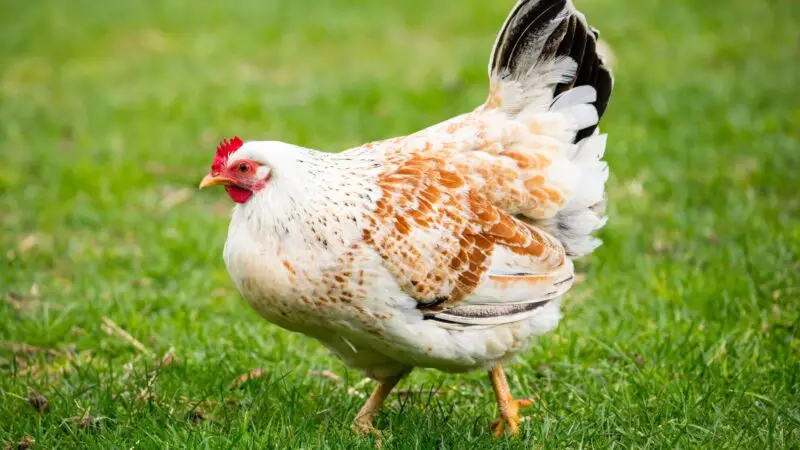
All hens can lay eggs, and they do so regardless of the help of roosters. Healthy hens can regularly produce eggs every 1 or 2 days. However, productivity and the total amount of eggs produced vary per chicken breed and farming conditions.
Why Do Hens Lay Eggs?
Hens naturally lay eggs to reproduce and create offspring, as biology dictates it, even without roosters as mating companions.
When Do Hens Start Laying Eggs?
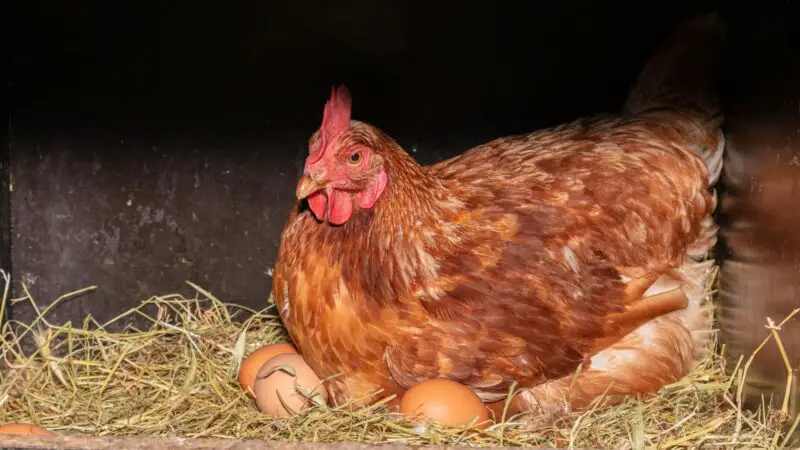
Depending on the breed, hens will start producing eggs when they reach 18 to 22 weeks old. They start and peak during the summer due to longer day lengths. Production can extend in fall and winter as long as artificial light is provided. If not, they take a break and then resume in spring.
How Do Hens Lay Eggs?
Hens release eggs into a hole referred to as a vent. It is also where the waste of the chicken (i.e., feces and urine) comes out.
A female chicken has two reproductive parts: one functional ovary and an oviduct. Their right ovary stops growing when the female chick hatches, so only the left one develops and becomes mature.
Here is the process of how hens lay eggs:
Step 1: The ovary, once it’s fully formed, contains a thousand tiny ova, each with its follicle. Once the female chick reaches reproductive maturity, the ova will develop a few at a time.
Step 2: If the ova is fertilized by a rooster, it will begin developing a chick embryo inside. If not, it will simply turn into the yolk and then be released from the ovary in a process called ovulation, which occurs every 24 to 26 hours. It takes as much as that time for the yolk to fully form into an egg with the white and shell developed.
Step 3: The hen’s body will then begin the laying process. Contractions will occur, and the intestines will be closed so that the egg can be safely delivered out of the hen without any fecal matter attached.
Step 4: Finally, an egg is pushed out of the hen’s body through its vent.
How Often Do Hens Lay Eggs?
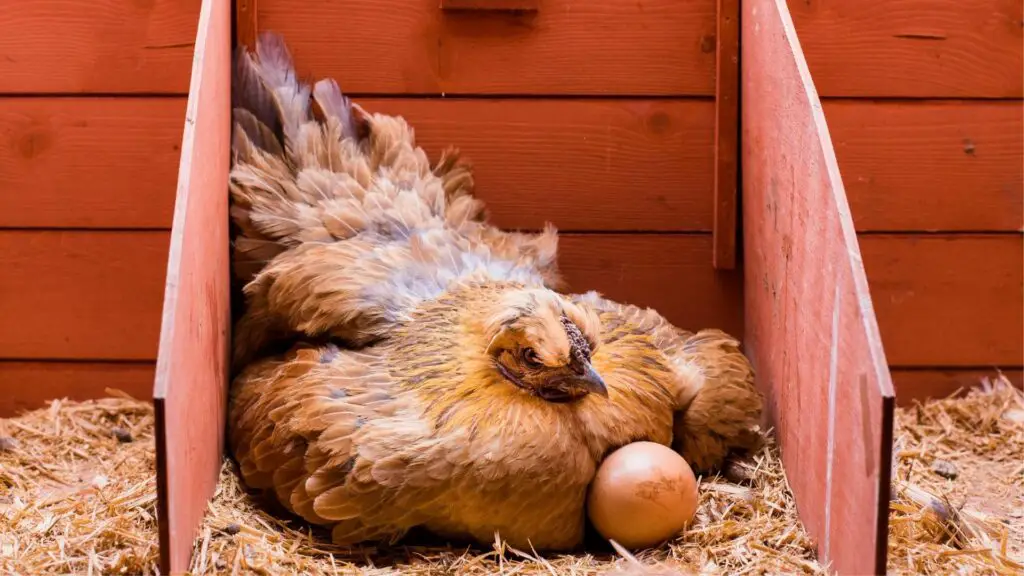
Once a day, assuming that the hen is well-fed and has optimal living conditions. However, since a hen’s cycle is 24 to 26 hours long, they may skip a day or more.
How Long Do Hens Lay Eggs?
Most flocks grown in backyards or for personal use will produce eggs for 3 to 4 years, with molting after every 12 to 14 months or earlier. Hens that are grown commercially are kept for only 2 to 3 years since egg productivity, size, shell, and quality decrease over time.
When hens age and are old enough to retire, chicken owners will add young hens every 2 to 3 years to keep production consistent.
How Many Eggs Does a Hen Lay a Day?
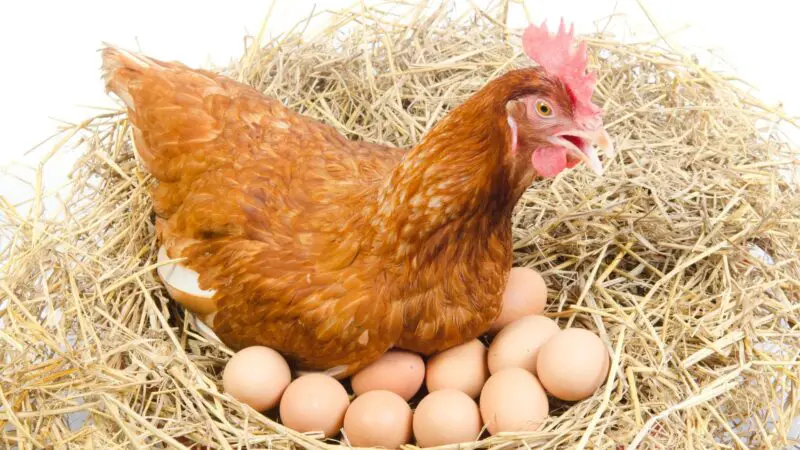
A hen lays one egg a day. However, hens can skip a day or more depending on their reproductive cycles so they don’t necessarily produce one egg a day consistently.
Related: How Many Eggs Will a Chicken Lay? | All You Need to Know!
When Do Hens Stop Laying Eggs?
Hens naturally stop laying eggs when they take a break during molt. It’s a period where they lose older feathers and grow new and better ones. After the molt is complete, they resume making eggs.
Molting can last as long as 4 to 6 months for early molters, or those that are considered poor egg producers, and as short as 2 to 3 months for late molters, or those that are efficient egg producers, depending on the hen.
They also lessen egg production or stop completely during late fall and winter due to the decrease in day length.
Do Old Hens Still Lay Eggs?
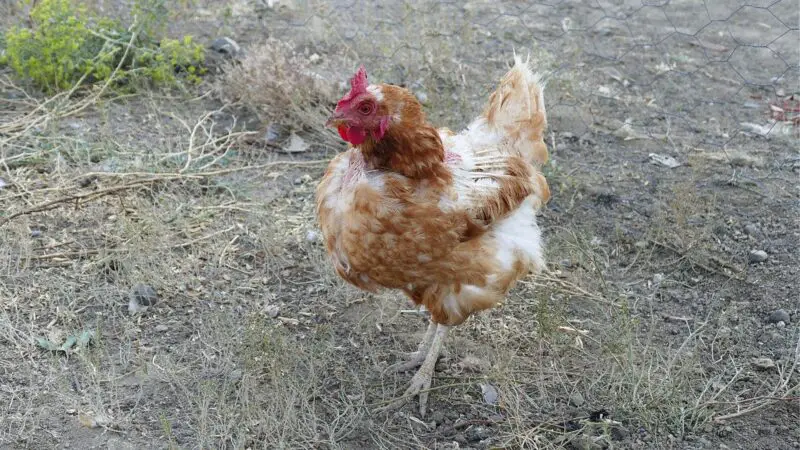
Old hens don’t lay eggs. Depending on where they’re grown, egg production will naturally decrease at 6 to 8 years of age, sometimes as early as 5 years, which will then be followed by retirement, or the hens will completely stop laying.
How Old Can a Chicken Be and Still Lay Eggs?
The maximum age at which they can still be laying eggs is 8 years old.
Why Are My Hens Not Laying Eggs?
It may be due to hens aging, management problems on the farm, or external factors, specifically the emergence of parasites and diseases that can harm the health of your hens.
Here are some of the probable causes for hens to decrease the number of eggs they produce or stop laying eggs altogether:
Aging
Egg productivity significantly declines after 2 to 3 years, but it varies greatly per hen. Hens that are considered good layers will produce eggs for 50 to 60 weeks and then have a resting period called a molt. Meanwhile, those considered poor layers and older hens will molt more often and, thus, lay eggs less.
Lack of Nutrition
Hens require a healthy and balanced diet to be able to produce their maximum egg production potential over time. When they lack nutrients, hens can stop laying eggs. When they have insufficient levels of calcium, energy, or protein, they lay fewer eggs.
Disruption in Feeding
A decline in egg production will be observed if hens are not fed for several hours or beyond their feeding schedules. Feed that is contaminated with molds can also negatively affect egg production.
The same goes when hens are lacking in drinking water. In fact, egg production levels are more sensitive to a lack of water than a lack of feed.
Insufficient Day Length
Hens need an average of 14 hours of daylight to sustain egg production levels, which is why production faces a severe decline or stops altogether during the fall and winter seasons when the days are shorter. Chicken owners will usually provide supplemental light to help hens lay eggs.
During these seasons, hens will undergo a molt and cease production entirely. They will then resume normal egg production time when spring starts.
Housing Temperature
When the temperatures of hen houses are high, hens get stressed out, and it can significantly affect the amount of feed they consume, as well as egg productivity, size, and hatchability.
Parasites
Ectoparasites such as lice, northern fowl mites, and fleas can severely reduce feed efficiency, egg production to as much as 20%, and the resilience of chickens against diseases.
Endoparasites such as nematodes and tapeworms can also lessen egg production and, in worse case scenarios, cause deaths among hens. Both of these parasites affect chickens’ gastrointestinal tracts.
Both types of parasites can also cause abnormal behavior, anxiety and irritation, general unthriftiness, and unkempt appearance among hens.
Diseases
Common diseases in chickens include fowl pox, which causes scabs and lesions on the unfeathered parts of chickens and ultimately affects growth and feed conversion, and Newcastle disease, a viral disease that has no treatment and is characterized by depression, appetite loss, and a decrease in egg production.
Related: Why Won’t My Chicken Lay Eggs? | All You Need to Know!
Can Laying Hens Be Used for Meat?
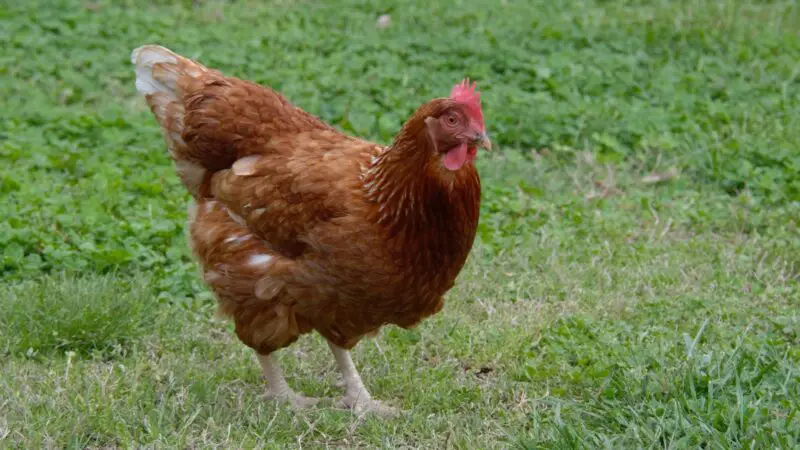
Laying hens can be used for meat. As such, their meat will be tough and full of fat that needs to be skimmed before cooking compared to the meat of chickens that are grown solely for meat production.
However, chicken breeds such as the Golden Comet serve a dual purpose of both egg laying and meat production.
To make hen meat more edible, it’s better if they are stewed or added to soups so that the meat is softened.
Frequently Asked Questions
Do All Eggs Turn Into Chickens?
Not all eggs turn into chickens. Only eggs that are fertilized by roosters and are properly incubated can turn into chicks and, eventually, full-fledged chickens.
Do Roosters Lay Eggs?
Roosters don’t lay eggs. They don’t have the reproductive parts that are responsible and necessary for laying eggs, such as ovaries and an oviduct. Instead, they have testes that produce sperm for egg fertilization.
Related: Can Roosters Lay Eggs? | Information and Facts
Why Do Chickens Lay Eggs Without Mating?
It is simply because their bodies are fulfilling a natural reproductive function. They ovulate and develop eggs, regardless if they have mated or not.
Can Unfertilized Eggs Hatch?
Unfertilized eggs can’t hatch. For eggs to hatch, a chick must be able to burst out of the egg itself.
Do We Eat Unfertilized Eggs?
We eat unfertilized eggs. The eggs you buy from supermarkets and grocery stores are unfertilized eggs and are used for human consumption since they don’t have chicks in them.
All hens lay eggs, and they can do so regardless if they have mated with a rooster or not. They produce one egg a day but occasionally skip days as their reproductive cycles take 24 to 26 hours.
Other factors that decrease egg production or stop it completely are farm management problems and the emergence of parasites and diseases.
List of Sources
Why Did Evolution Create a Chicken That Lays So Many Unfertilized Eggs When That Is So Wasteful?
